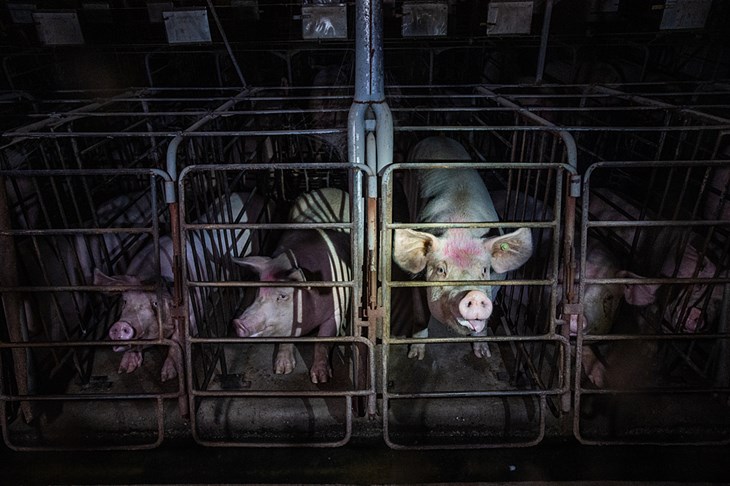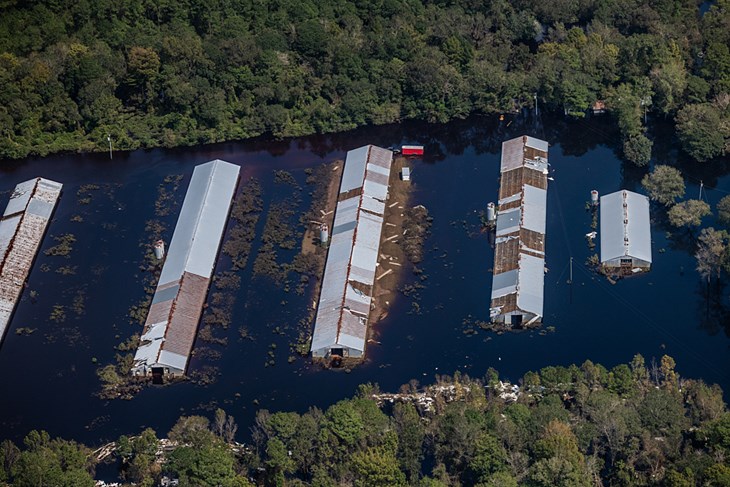9/5/2024
by Ben Williamson
The Industrial Agriculture Accountability Act of 2023 (H.R.805/ S.272) is proposed legislation designed to hold large-scale industrial agriculture operations accountable for their environmental, social, and ethical impacts. The bill is a response to the growing concerns about the disastrous impact of factory farming on animals, workers, communities, and ecosystems.
For Compassion in World Farming, the IAA Act represents a vital step toward dismantling the current factory farming model, which prioritizes profits over the welfare of animals, environmental sustainability, and public health. CIWF’s support for the IAA Act is rooted in several key reasons that align with our mission to end factory farming and move toward a more humane and sustainable food system.
1. Defense of non-ambulatory animals
One of the primary reasons CIWF supports the IAA Act is its potential to spare farmed animals who cannot walk the indignity of slaughter and give them a more peaceful and humane ending. The IAA Act would prevent the meat from non-ambulatory pigs, cows, and sheep, from ending up in our food system, something which food safety experts say poses a human health risk. So-called “downed” animals are more likely to harbor and transmit food-borne diseases, such as Salmonella and Campylobacter and risk passing on zoonotic diseases to farm and slaughterhouse workers.
Millions of farmed animals are crippled by confinement on factory farms every year. Mother pigs are kept in crates so small, they can’t turn around. Dairy cows have been selectively bred to grow large and produce so much milk that their legs can often not support their own bodyweight. Mandating that these animals are euthanized instead of slaughtered would give them a less painful ending and could lead to improved welfare outcomes in the future.

2. Bans mass culling of animals through heatstroke
The IAA Act also bans the mass culling of animals through inhumane methods such as Ventilation Shutdown (VSD), a method of depopulation commonly used in the poultry industry. VSD, which has gained notoriety due to recent outbreaks of bird flu, involves sealing a barn in which birds are housed in response to an outbreak of disease, turning off the fans, increasing the heat and cooking the birds alive–tens or hundreds of thousands at a time.
Chickens subjected to VSD writhe, pant, and even throw themselves against the walls of their confinement in a desperate attempt to escape. Eventually after between one and three hours of this torturous experience, the birds collapse and, finally, die from heatstroke and suffocation. Instead of VSD, Compassion in World Farming advocates for the use of high-expansion nitrogen-based foam as a more humane method of depopulation, similar in many ways to the types of foam used by firefighters.
3. Enforces disaster preparedness plans
More widely the bill calls for industrial operators to submit disaster preparedness plans and fund a new government agency to enforce more humane disaster mitigation efforts. In 2018, Hurricane Florence killed millions of chickens and turkeys, and thousands of pigs in North Carolina. Disaster planning efforts that currently exist aren’t focused as much on keeping animals alive during severe weather as they are on protecting equipment from damage and managing mortality after an event.

4. Includes poultry in the Humane Methods of Slaughter Act
The IAA Act also amends the Humane Methods of Slaughter Act of 1958 to include poultry, which it currently does not. Around 10 billion land animals are slaughtered for food every year in the US, and around 9 billion of those are chickens raised for meat. Typically, chickens are shackled upside down by their legs on a processing line, their heads are dragged through an electrified water bath to render them unconscious and then a small blade slits their throats, and they bleed to death. Studies suggest that millions of birds may be conscious as they enter the scolding hot de-feathering tank due to improper stunning and slaughter methods.
The inclusion of poultry in the Humane Methods of Slaughter Act might allow for re-stunning or slower line speeds to check for signs of consciousness, and would almost certainly lead to an increase in more humane methods of slaughter such as Controlled Atmosphere Stunning, in which birds are knocked out by CO2 or argon gas.
Take Action
Compassion in World Farming’s support for the Industrial Agriculture Accountability Act is grounded in our commitment to creating a more humane, sustainable, and equitable food system. By advocating for stronger animal welfare standards, environmental protections, transparency, and worker rights, the IAA Act addresses the urgent need for reform in animal agriculture.
CIWF believes that this legislation is a crucial step toward ending factory farming and building a future where both animals and people can thrive.
Tell Congress to hold meat industry giants accountable for animal, worker and community suffering by sending your message today.

